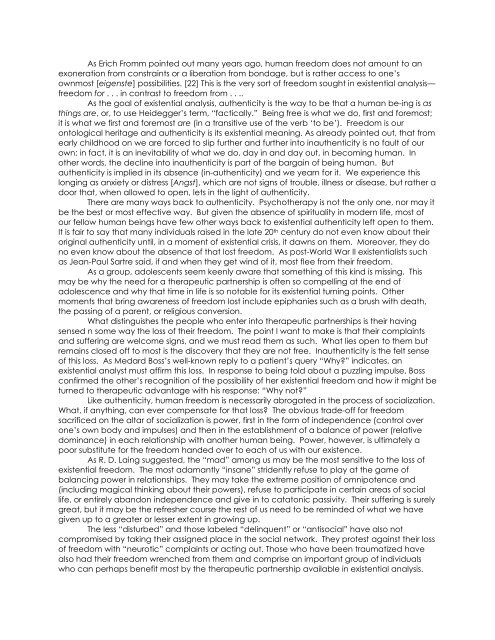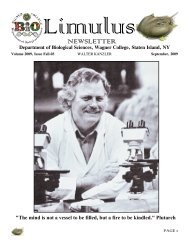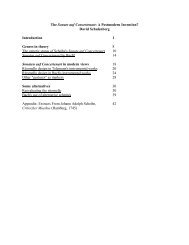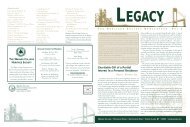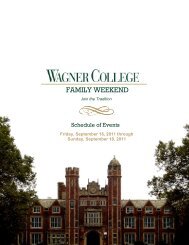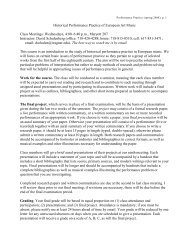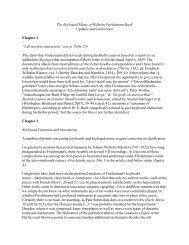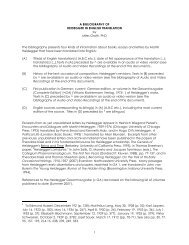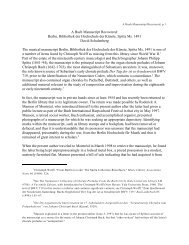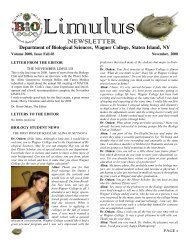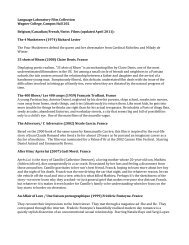SEVEN PAPERS ON EXISTENTIAL ANALYSIS ... - Wagner College
SEVEN PAPERS ON EXISTENTIAL ANALYSIS ... - Wagner College
SEVEN PAPERS ON EXISTENTIAL ANALYSIS ... - Wagner College
Create successful ePaper yourself
Turn your PDF publications into a flip-book with our unique Google optimized e-Paper software.
As Erich Fromm pointed out many years ago, human freedom does not amount to an<br />
exoneration from constraints or a liberation from bondage, but is rather access to one’s<br />
ownmost [eigenste] possibilities. [22] This is the very sort of freedom sought in existential analysis—<br />
freedom for . . . in contrast to freedom from . . ..<br />
As the goal of existential analysis, authenticity is the way to be that a human be-ing is as<br />
things are, or, to use Heidegger’s term, “factically.” Being free is what we do, first and foremost;<br />
it is what we first and foremost are (in a transitive use of the verb ‘to be’). Freedom is our<br />
ontological heritage and authenticity is its existential meaning. As already pointed out, that from<br />
early childhood on we are forced to slip further and further into inauthenticity is no fault of our<br />
own; in fact, it is an inevitability of what we do, day in and day out, in becoming human. In<br />
other words, the decline into inauthenticity is part of the bargain of being human. But<br />
authenticity is implied in its absence (in-authenticity) and we yearn for it. We experience this<br />
longing as anxiety or distress [Angst], which are not signs of trouble, illness or disease, but rather a<br />
door that, when allowed to open, lets in the light of authenticity.<br />
There are many ways back to authenticity. Psychotherapy is not the only one, nor may it<br />
be the best or most effective way. But given the absence of spirituality in modern life, most of<br />
our fellow human beings have few other ways back to existential authenticity left open to them.<br />
It is fair to say that many individuals raised in the late 20 th century do not even know about their<br />
original authenticity until, in a moment of existential crisis, it dawns on them. Moreover, they do<br />
no even know about the absence of that lost freedom. As post-World War II existentialists such<br />
as Jean-Paul Sartre said, if and when they get wind of it, most flee from their freedom.<br />
As a group, adolescents seem keenly aware that something of this kind is missing. This<br />
may be why the need for a therapeutic partnership is often so compelling at the end of<br />
adolescence and why that time in life is so notable for its existential turning points. Other<br />
moments that bring awareness of freedom lost include epiphanies such as a brush with death,<br />
the passing of a parent, or religious conversion.<br />
What distinguishes the people who enter into therapeutic partnerships is their having<br />
sensed n some way the loss of their freedom. The point I want to make is that their complaints<br />
and suffering are welcome signs, and we must read them as such. What lies open to them but<br />
remains closed off to most is the discovery that they are not free. Inauthenticity is the felt sense<br />
of this loss. As Medard Boss’s well-known reply to a patient’s query “Why?” indicates, an<br />
existential analyst must affirm this loss. In response to being told about a puzzling impulse, Boss<br />
confirmed the other’s recognition of the possibility of her existential freedom and how it might be<br />
turned to therapeutic advantage with his response: “Why not?”<br />
Like authenticity, human freedom is necessarily abrogated in the process of socialization.<br />
What, if anything, can ever compensate for that loss? The obvious trade-off for freedom<br />
sacrificed on the altar of socialization is power, first in the form of independence (control over<br />
one’s own body and impulses) and then in the establishment of a balance of power (relative<br />
dominance) in each relationship with another human being. Power, however, is ultimately a<br />
poor substitute for the freedom handed over to each of us with our existence.<br />
As R. D. Laing suggested, the “mad” among us may be the most sensitive to the loss of<br />
existential freedom. The most adamantly “insane” stridently refuse to play at the game of<br />
balancing power in relationships. They may take the extreme position of omnipotence and<br />
(including magical thinking about their powers), refuse to participate in certain areas of social<br />
life, or entirely abandon independence and give in to catatonic passivity. Their suffering is surely<br />
great, but it may be the refresher course the rest of us need to be reminded of what we have<br />
given up to a greater or lesser extent in growing up.<br />
The less “disturbed” and those labeled “delinquent” or “antisocial” have also not<br />
compromised by taking their assigned place in the social network. They protest against their loss<br />
of freedom with “neurotic” complaints or acting out. Those who have been traumatized have<br />
also had their freedom wrenched from them and comprise an important group of individuals<br />
who can perhaps benefit most by the therapeutic partnership available in existential analysis.


